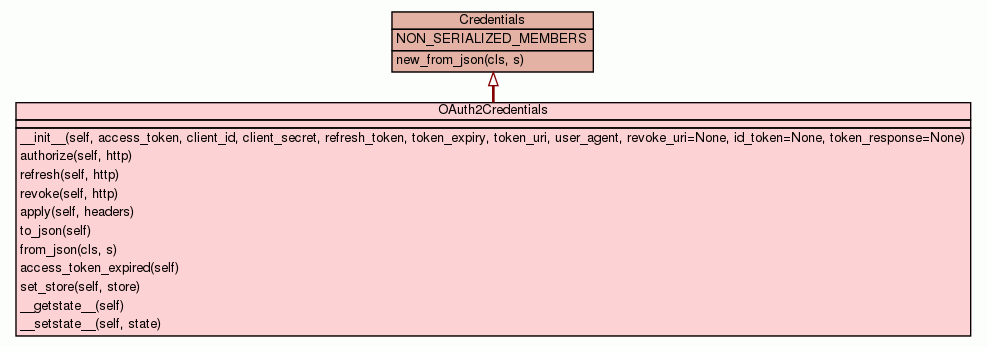
| Trees | Indices | Help |
|---|
|
|

Credentials object for OAuth 2.0. Credentials can be applied to an httplib2.Http object using the authorize() method, which then adds the OAuth 2.0 access token to each request. OAuth2Credentials objects may be safely pickled and unpickled.
|
|||
|
|||
|
|||
|
|||
|
|||
|
|||
|
|||
|
|||
|
|||
|
|||
|
|||
|
|||
|
|||
|
|||
|
|||
|
|||
|
|||
|
|||
|
Inherited from Inherited from |
|||
|
|||
|
|||
|
Inherited from |
|||
|
|||
|
Inherited from |
|||
|
|||
|
Inherited from |
|||
|
|||
Create an instance of OAuth2Credentials.
This constructor is not usually called by the user, instead
OAuth2Credentials objects are instantiated by the OAuth2WebServerFlow.
Args:
access_token: string, access token.
client_id: string, client identifier.
client_secret: string, client secret.
refresh_token: string, refresh token.
token_expiry: datetime, when the access_token expires.
token_uri: string, URI of token endpoint.
user_agent: string, The HTTP User-Agent to provide for this application.
revoke_uri: string, URI for revoke endpoint. Defaults to None; a token
can't be revoked if this is None.
id_token: object, The identity of the resource owner.
token_response: dict, the decoded response to the token request. None
if a token hasn't been requested yet. Stored because some providers
(e.g. wordpress.com) include extra fields that clients may want.
Notes:
store: callable, A callable that when passed a Credential
will store the credential back to where it came from.
This is needed to store the latest access_token if it
has expired and been refreshed.
|
Authorize an httplib2.Http instance with these credentials.
The modified http.request method will add authentication headers to each
request and will refresh access_tokens when a 401 is received on a
request. In addition the http.request method has a credentials property,
http.request.credentials, which is the Credentials object that authorized
it.
Args:
http: An instance of httplib2.Http
or something that acts like it.
Returns:
A modified instance of http that was passed in.
Example:
h = httplib2.Http()
h = credentials.authorize(h)
You can't create a new OAuth subclass of httplib2.Authenication
because it never gets passed the absolute URI, which is needed for
signing. So instead we have to overload 'request' with a closure
that adds in the Authorization header and then calls the original
version of 'request()'.
|
Forces a refresh of the access_token.
Args:
http: httplib2.Http, an http object to be used to make the refresh
request.
|
Revokes a refresh_token and makes the credentials void.
Args:
http: httplib2.Http, an http object to be used to make the revoke
request.
|
Add the authorization to the headers. Args: headers: dict, the headers to add the Authorization header to.
|
Creating a JSON representation of an instance of Credentials. Returns: string, a JSON representation of this instance, suitable to pass to from_json().
|
Instantiate a Credentials object from a JSON description of it. The JSON should have been produced by calling .to_json() on the object. Args: data: dict, A deserialized JSON object. Returns: An instance of a Credentials subclass.
|
True if the credential is expired or invalid. If the token_expiry isn't set, we assume the token doesn't expire.
|
Set the Storage for the credential.
Args:
store: Storage, an implementation of Stroage object.
This is needed to store the latest access_token if it
has expired and been refreshed. This implementation uses
locking to check for updates before updating the
access_token.
|
Refreshes the access_token.
This method first checks by reading the Storage object if available.
If a refresh is still needed, it holds the Storage lock until the
refresh is completed.
Args:
http_request: callable, a callable that matches the method signature of
httplib2.Http.request, used to make the refresh request.
Raises:
AccessTokenRefreshError: When the refresh fails.
|
Refresh the access_token using the refresh_token.
Args:
http_request: callable, a callable that matches the method signature of
httplib2.Http.request, used to make the refresh request.
Raises:
AccessTokenRefreshError: When the refresh fails.
|
Revokes the refresh_token and deletes the store if available.
Args:
http_request: callable, a callable that matches the method signature of
httplib2.Http.request, used to make the revoke request.
|
Revokes the credentials and deletes the store if available.
Args:
http_request: callable, a callable that matches the method signature of
httplib2.Http.request, used to make the refresh request.
token: A string used as the token to be revoked. Can be either an
access_token or refresh_token.
Raises:
TokenRevokeError: If the revoke request does not return with a 200 OK.
|
| Trees | Indices | Help |
|---|
| Generated by Epydoc 3.0.1 on Tue Aug 6 12:16:45 2013 | http://epydoc.sourceforge.net |